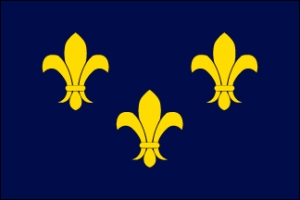2011 Harleckese coup d'état
| Harleckese Coup D'etat, 2011 | |||||||
|---|---|---|---|---|---|---|---|
| |||||||
| Belligerents | |||||||
|
|
| ||||||
| Commanders and leaders | |||||||
| Phillip Stone | John Hawkinge | ||||||
| Strength | |||||||
| 7 people (3 National Guardsmen, 4 citizens) | 3 (1 National Guardsmen, 2 citizens) | ||||||
Before the Coup
On June 5, 2011, a small group of people met in at a house, and decided to begin to draft a constitution for a micronation, which had been inspired by Molossia, Vikesland, and Austenasia.
On June 7, a flag of the fleur de lis was flown over the newly founded town of New Haven, and the citizens voted in John A. Hawkinge into office of Prime Minister, and he ordered the creation of a National Congress of Harleck. The process, however, became slow and painful, and people began to grow weary.
Economic collapse and coup d'etat
Economic collapse of June 24th
On June 24, the National Congress announced that the economic situation was to much for the Bank of Harleck to process, and therefore, it was closed down, causing 45% of Harleckese citizens to lose their jobs. Some people in the National Congress protested, but they were soon thrown out by the Prime Minister.
National protests on June 28th
On June 28, 3 protesters gathered outside the Prime Minister's house. Among those was Phillip Stone, who was kicked out of the National Congress for protesting against the loss of jobs. The 3 protesters shouted in anger for 45 minutes until militia from the Harleckese National Guard fired on the protesters with dart guns, driving the protests away on that day.

All Out Rebellion
On July 3, Phillip Stone, who had been fired upon on the Protests of June 28, addressed the nation through interrupting government broadcasts, and said,
"The people of this nation have had enough with the wishy washy unfair politics that have been used for the past month, join the cause of freedom, and drive John out of power."
Troops from the National Guard (which consisted of 4 people at the time), along with regular citizens, moved behind the Prime Minister's house on July 5, fully armed, demanding an end to the madness or civil war would break out.
Battle of the Bees
On July 5, at 3 o'clock in the afternoon, troops from both sides collided in an attack at Creekville Peak. The Loyalist Harleckese (which consisted of 3 citizens) charged the defensive rebel positions, and drove the rebels off; 30 minutes later, at 3:30, rebels counterattacked and drove the Loyalists off the peak. Finally, at 4:00, an all out attack on the rebels began, but an unknown assailant fired into the air, hitting a bee hive. The bees, agitated by the shot, attacked both sides. Everyone fled, and both sides claimed victory.
Resignation of John Hawkinge
On August 1, John Hawkinge announced his resignation in a national broadcast, and announced that he was leaving Harleck for good, and to give up micronationalism. Phillip Stone won in a national referendum and reorganized the government into a true representative democracy. Phillip abolished the National Congress and replaced it with the Assembly of Harleck.
International Viewing
Despite it's length, the Harleckese Coup D'Etat was gone very unnoticed at the time it was going on. People believed this was because of the lack of communication that the Republic had at the time, which it did, but mainly it was because the Coup had only a few major events when it was ongoing at the time. This lack of attention, gave the international community a very confused opinion on The Republic of Harleck, and it still goes on to this day.